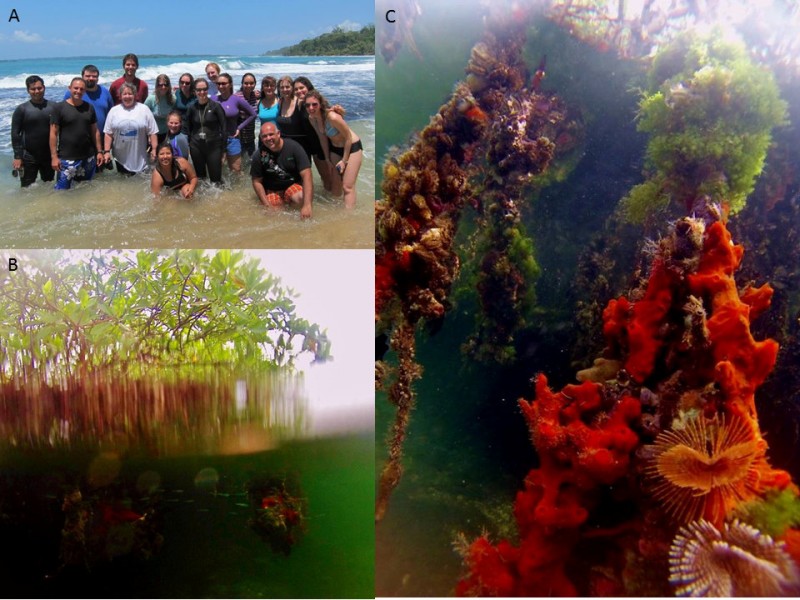Tropical Field Phycology Course 2015 - Panama
Laura Bush
University of Bangor

Photo Caption: Tropical Field Phycology Course 2015. A. The Team ( Left to Right. Back:: Maycol Madrid, Will Schmidt, Micah Marty, Laurie McConnico, Holly Cronin, Sofie Vranken, Talita Pinto, Lynn Cornish, Glenda Hunter, Mary Cruz Rojas, Emilia Croce.. Mid: Luis Reyes, Suzanne Fredericq, Laura Bush, Robin Taylor, Mariana Mungioli, Abdiel Jover, Front: Karla Pedraza. B. What lies beneath? C. Discovering the wonders of the seaweed communities of Bocas del Toro.
Tropical Field Phycology Course 2015
The Smithsonian Tropical Research Institute (STRI) have run three previous Tropical Field Phycology courses from their Bocas del Toro Research Station on the Caribbean coast of Panama since 2008. In 2015 I was privileged to be offered a place the fourth course along with 15 other students from, in alphabetical order, Argentina, Belgium, Brazil, Canada, Costa Rica, Cuba, Mexico, the host nation, and the USA. Our instructors Wilson Freshwater, Suzanne Frederiqc and William Schmidt also travelled from afar (USA).The course focused on the development and enhancement of the practical skills required for collection, processing, and preservation of tropical marine macroalgae, with numerous collections occurring in a diverse range of marine environments within the Caribbean (e.g. mangroves, seagrass meadows, coral reefs, sponge communities). Specimens were identified morphologically in the Bocas del Toro laboratory with assistance from available literature and informed opinion. The course participants had a wide range of specialised knowledge, supplementary to the expert knowledge of the instructors, facilitating abundant knowledge exchange. Specimens were predominantly preserved by press, with those that required additional molecular analysis preserved in silica gel. Individual species plates were produced contributing to the Bocas del Toro Biodiversity Inventory.
In addition to practical work, daily lectures were available on morphological and molecular identification, macroalgal taxonomy, in addition to case studies of the instructors work. My personal favourite was the talk by Suzanne Frederiqc on the long term impact of the Gulf of Mexico oil spill on Rhodolith beds and their associated flora, a relatively rare but perhaps very resilient habitat. Course participants also presented their research with my oral presentation on the long-term change of large brown macroalgae in the British Isles receiving great interest.
This was a thoroughly enjoyable and educational experience through which I gained a deep insight into entirely new ecosystems, complete with new genera and species. Additionally I formed many rewarding links with a wide range of people from many different backgrounds. I have returned to the UK reinspired with regards my current research and potential future career, and I cannot thank the Challenger Society enough for their generous Travel Grant which enabled me to attend this course.
Profile:
I am currently writing up my PhD on “the stability and variability of marine coastal habitats on decadal time-scales” at Bangor University, North Wales. My PhD has focused on change in ecosystem engineers, specifically the large brown macroalgae and the honeycomb reef worm Sabellaria alveolata, around the coast of the British Isles and I am co-author on several papers and reviews in both habitats (see references). I completed my Masters at Heriot Watt University, Scotland, in Marine Resource Development and Protection, and prior to my PhD I was employed as a Marine Ecologist with the Scottish Environment Protection Agency and consequently I have expertise in benthic invertebrate, phytoplankton and macroalgal taxonomy.
Twitter:
Tropical Field Phycology 2015, the experience of a lifetime, made possible by the Challenger Society #algaeRbeautiful #seaweediversity #BocasStation
Latest News
Royal Society Publishing Photography Competition 2025
Please see a message from the Royal Society below:
We are delighted to announce that the 2025 Competition is now open for entries until 15 August for a chance to win £1000! The competition celebrates the power of photography in conveying the wonder of science happening all around us and photographs can be submitted in the categories of: Astronomy, Behaviour, Earth Science and Climatology, Ecology and Environmental Science, and Microimaging.
The competition is free to enter and open to anyone studying or working in science at graduate level or above. Category winners will receive a one-year membership to the Royal Photographic Society and the overall winner will receive a grand prize of £1,000. Find out more: https://bit.ly/RSPphotocomp
October 2025 MEDIN Workshop: Marine Data Management, Governance and the MEDIN toolset
The Marine Environmental Data and Information Network (MEDIN) are pleased to announce that registration is now open for the next occurrence of our popular free online training workshop: ‘Marine Data Management, Governance and the MEDIN toolset’ on the 13th – 17th October 2025 on OceanTeacher Global Academy.
Marine Data Management, Governance and the MEDIN toolset
The Marine Environmental Data and Information Network (MEDIN) and OceanWise are delighted to invite you to attend our popular free online training workshop: ‘Marine Data Management, Governance and the MEDIN toolset’ on the 19th – 23rd of May 2025.
